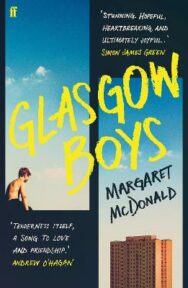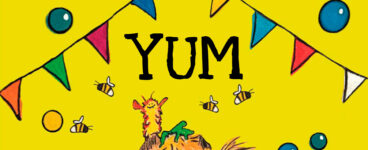‘Scots, its history, its punctuation, its structure, are not taught to us in school, and so it’s easy to imagine how Scots gets lost along the way.’
Margaret McDonald’s striking debut novel explores the power of identity, community and the Scottish working class. The coming-of-age story is an incisive look at young masculinity and the way even the most fraught childhood is not without hope. Margaret McDonald explores her thoughts on using the Scots language.
Glasgow Boys
By Margaret McDonald
Published by Faber
Glasgow Boys and its Scots
When I was asked to write about how I use Scots in Glasgow Boys, I found myself drawing such a blank. I’ve never actually been taught Scots or even its history, so I felt very displaced and ill-equipped to talk about it as though I were an expert.
Scots to many people is something so innate and closely protected, it can feel quite difficult to explain to those who have never been introduced to it. Scots speakers possibly don’t have a lot of opportunities to do that either: if they were to discuss Scots it would more than likely be with fellow speakers.
Yet I realised that in writing about Scots, both in Glasgow Boys and here, I could open up not just other people’s understanding of the language but also my own.
Scots is my heritage as my family members regularly speak Scots, but I wouldn’t call myself someone who uses it in their day to day life – this essay, as well as Glasgow Boys, is very clearly written in English. But I believe coming to Scots as a new language today is something to be celebrated, a sort of reclamation of part of our history and culture. After all, how do we expect a language to survive if we don’t pass it on?
Although I was born in Glasgow, I was brought up in East Kilbride. For me, there was both a disconnect and an attachment to Glasgow growing up, which is something I explore in Glasgow Boys – both through the Scots language, and the fact that Finlay is Polish living in Glasgow, and Banjo is a Glaswegian Scots speaker living in East Kilbride.
In writing Glasgow Boys, I felt a responsibility to authentically portray the Scots I know and love. Yet I am not someone who would claim to be a native speaker, rather a person trying to regain this part of their culture and their connection to their Scottish roots.
Banjo is the main Scots speaker in Glasgow Boys, alongside a few other secondary characters Finlay meets while living in the West End and studying at university. But Banjo, having moved around in the foster care system his entire life and never really settling anywhere for long, speaks a more hybrid form of Scots/English that ‘code-switches’ depending on the situation.
Banjo often relies on English to be understood, and as we see throughout the novel he often edits himself in a more formal setting such as school or family dinner. Equally, this is a measure of distance that Banjo can draw and fall back on if he feels especially vulnerable or raw. New foster parents, new town, new something, he needs that shield.
But on the reverse of this, his emotions can draw out his Scots unwittingly whether he wants to or not, and this most often includes his anger.
I think this portrayal of speaking Scots is the most faithful one to Banjo’s upbringing in foster care, but equally I would like to think it’s faithful to young Scots speakers today, who have learned how to soften their accent and code-switch to English, and also young Scottish people who are just learning about this part of their culture.
If you were asked to consider your native language, your mother tongue, you might find you never have thought about it. You learn it before you ever remember having been taught – it’s only later we then learn basic grammar and punctuation, how to even properly apply the language we’ve been stumbling around in the dark with up to our school days.
Yet Scots, its history, its punctuation, its structure, are not taught to us in school, and so it’s easy to imagine how Scots gets lost along the way.
It’s strange to think that we pay so little attention to our tool of communication: the instrument we use to access the world. Growing up, I could understand Scots entirely, yet I know I cannot call myself a Scots speaker because it’s not the language I move through the world with. Even still, it’s a language I want to learn and honour as part of myself.
I believe that there are different forms of Scots, often known as different ‘dialects’. Glasgow’s Scots is not Edinburgh’s Scots: there are differences one would hear in reading Trainspotting as compared to Shuggie Bain. I myself as a Glaswegian learned so many colourful phrases in Trainspotting, my favourite being ‘Embra’.
These representations of our small differences are so important, and they highlight the language’s complexities in ways we are still uncovering while they also give it colour and life and personality.
I hoped, through Glasgow Boys, to be true to the experience of Scots speakers as well as people who code-switch between Scots and English and also people that are coming to Scots for the very first time, even if they themselves are Scottish. I wanted to be able to honour all experiences with the language as valid and belonging to Glasgow.
I would love more than anything to imagine that Glasgow Boys could play a part, however small, in the revival of Scots in mainstream culture – joining, of course, the long legacy that comes before me and the legacy that hopefully will continue afterwards.
Useful Resources:
- https://www.gov.scot/policies/languages/scots/#scots – Scottish Government ‘Lanuages’.
- https://www.thenational.scot/culture/20108697.scots-definitely-language-not-dialect/ – The National, ‘Here’s why Scots is definitely its own language and not a dialect’.
- https://www.atlasobscura.com/articles/scots-language – Atlas Obscura, ‘How the English Failed to Stamp Out the Scots Language’.
- https://www.wildernessscotland.com/blog/scots-language/ – Wilderness Scotland, ‘A Look at Scots Language’.
Glasgow Boys by Margaret McDonald is published by Faber in May, priced £8.99.
ALSO IN THIS ISSUE

 Video Reading: Reek by Alastair Chisholm
Video Reading: Reek by Alastair Chisholm
‘I cannot wait to share it with you all. Sparrow is an amazing hero and the whole thing takes place …














